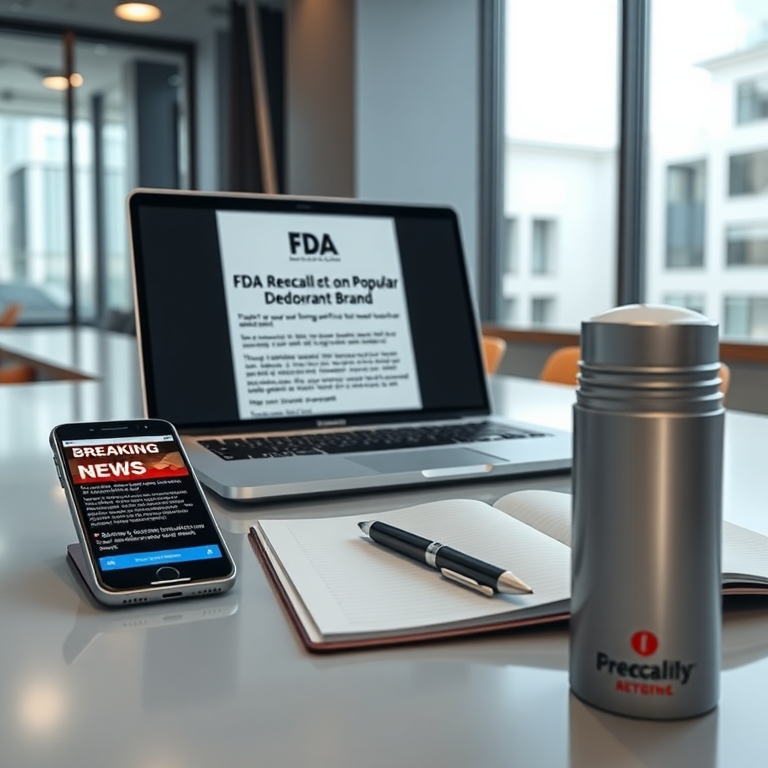In a significant development that has sent ripples through the personal care industry, the U.S. Food and Drug Administration (FDA) has issued a recall for a widely-used deodorant brand, citing health concerns that have alarmed both consumers and industry stakeholders. This move underscores the critical role of regulatory oversight in ensuring product safety and reflects the complex balance between consumer trust and corporate responsibility.
The deodorant brand in question, a household name with a substantial market share, has long been favored for its effective odor control and diverse range of fragrances. However, recent findings have prompted the FDA to take decisive action. The recall was initiated after a series of tests revealed the presence of a potentially harmful chemical compound in the product, which, according to the FDA, could pose health risks to consumers over prolonged exposure.
The compound, identified as benzene, is a known carcinogen, and its presence in personal care products is highly concerning. Benzene is not an intended ingredient in deodorant manufacturing; rather, it is often a contaminant introduced during the production process. Prolonged exposure to benzene has been linked to an increased risk of leukemia and other blood disorders, making its detection in a consumer product particularly alarming. The recall affects several batches of the deodorant, and the FDA has urged consumers to discontinue use immediately.
The company’s response to the recall has been swift and comprehensive. In an official statement, the brand expressed its commitment to consumer safety and transparency. It announced a full collaboration with the FDA to address the issue and pledged to conduct an internal investigation to determine the source of contamination. The company has also set up a dedicated hotline and website to assist consumers in identifying affected products and obtaining refunds.
This incident highlights the intricate supply chain dynamics that can lead to such contamination. In personal care product manufacturing, even minute lapses in quality control can have far-reaching consequences. Experts suggest that the presence of benzene in the deodorant may have resulted from the use of contaminated raw materials, improper storage conditions, or inadequate purification processes. The recall serves as a stark reminder of the critical importance of rigorous quality assurance protocols and the need for continuous vigilance in supply chain management.
The recall has significant implications for the deodorant brand and the broader personal care industry. For the brand, the immediate concern is the potential impact on its reputation and financial performance. Trust, once shaken, can be difficult to rebuild, and the brand’s ability to swiftly and effectively address consumer concerns will be crucial in mitigating long-term damage. The company will need to demonstrate transparency and accountability in its response to reassure consumers and stakeholders of its commitment to safety and quality.
For the industry as a whole, the recall is likely to prompt a reevaluation of safety standards and regulatory compliance. It serves as a wake-up call for manufacturers to scrutinize their production processes and supply chains more closely to prevent similar incidents. The FDA’s action may also lead to stricter regulatory scrutiny and heightened consumer awareness, driving demand for safer and more eco-friendly products. This could accelerate innovation in the industry, with companies investing in safer ingredients and more sustainable production methods.
The recall also raises broader questions about the role of regulatory agencies in safeguarding public health. The FDA’s proactive approach in this case underscores the importance of regulatory oversight in identifying and addressing potential health risks before they become widespread. It also highlights the need for robust mechanisms for monitoring and testing consumer products to ensure compliance with safety standards.
Consumer advocacy groups have applauded the FDA’s decisive action, emphasizing the importance of regulatory vigilance in protecting public health. They have called for greater transparency in product labeling and more stringent regulations to prevent harmful chemicals from entering the consumer market. These groups argue that consumers have the right to know what is in the products they use daily and to make informed choices based on that knowledge.
In conclusion, the FDA’s recall of this popular deodorant brand serves as a cautionary tale for the personal care industry and underscores the critical importance of product safety and consumer protection. It highlights the complex interplay between regulatory oversight, corporate responsibility, and consumer trust. As the affected company navigates the challenges posed by the recall, its actions will be closely watched by industry peers, regulators, and consumers alike. Ultimately, this incident may serve as a catalyst for positive change, prompting companies to prioritize safety and transparency in their operations and leading to a more informed and empowered consumer base.

Leave a Reply